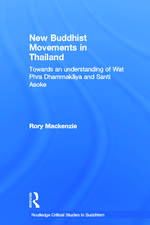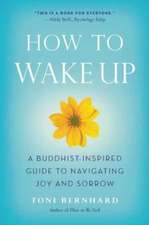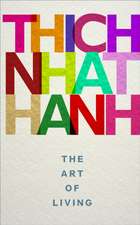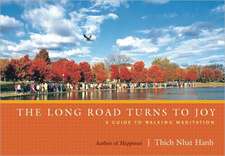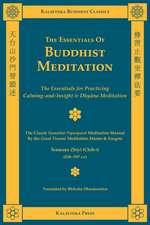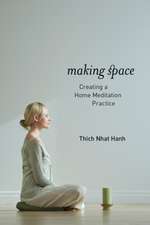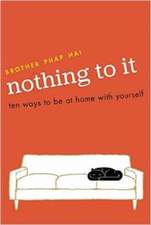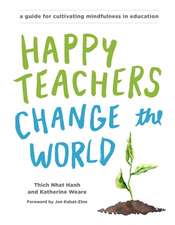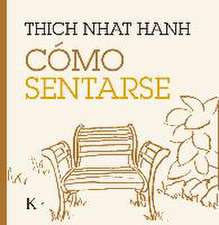The Mindfulness Survival Kit: Five Essential Practices
Autor Thich Nhat Hanhen Limba Engleză Paperback – 25 noi 2013
The Five Mindfulness Trainings (also referred to as “Precepts”) — not to kill, steal, commit adultery, lie, or take intoxicants — are the basic statement of ethics and morality in Buddhism. In this fully revised edition, Zen Master and peace activist Thich Nhat Hanh argues eloquently for their applicability in our daily lives and on a global scale. Nhat Hanh discusses the value and meaning of each precept, offering insights into the role that it could play in our changing society.
Thich Nhat Hanh calls the trainings a “diet for a mindful society.” With this book he offers a valuable contribution to the debate, on how we can come together to define secular, moral guidelines that will allow us to explore and sustain a sane, compassionate, and healthy way of living. The Five Mindfulness Trainings offer a path to restoring meaning and value in a world marked by moral and spiritual emptiness. Whether called virtues, ethics, moral conduct, or precepts they are guidelines for living without bringing harm to others; they bring sanity and light into the world.
Thich Nhat Hanh calls the trainings a “diet for a mindful society.” With this book he offers a valuable contribution to the debate, on how we can come together to define secular, moral guidelines that will allow us to explore and sustain a sane, compassionate, and healthy way of living. The Five Mindfulness Trainings offer a path to restoring meaning and value in a world marked by moral and spiritual emptiness. Whether called virtues, ethics, moral conduct, or precepts they are guidelines for living without bringing harm to others; they bring sanity and light into the world.
Preț: 62.32 lei
Preț vechi: 75.27 lei
-17% Nou
Puncte Express: 93
Preț estimativ în valută:
11.92€ • 12.45$ • 9.87£
11.92€ • 12.45$ • 9.87£
Carte disponibilă
Livrare economică 14-21 martie
Livrare express 27 februarie-05 martie pentru 30.40 lei
Preluare comenzi: 021 569.72.76
Specificații
ISBN-13: 9781937006341
ISBN-10: 1937006344
Pagini: 203
Dimensiuni: 112 x 163 x 20 mm
Greutate: 0.18 kg
Ediția:Revizuită
Editura: Parallax Press
ISBN-10: 1937006344
Pagini: 203
Dimensiuni: 112 x 163 x 20 mm
Greutate: 0.18 kg
Ediția:Revizuită
Editura: Parallax Press
Cuprins
Foreword; Joan Halifax, The Road Is Your Footsteps
Introduction
The Five Mindfulness Trainings
First Mindfulness Training, Reverence for Life
Second Mindfulness Training, Generosity
Third Mindfulness Training, Sexual Responsibility
Fourth Mindfulness Training, Deep Listening and Loving Speech
Fifth Mindfulness Training, Diet for a Mindful Society
The Three Jewels
Commentary on the Three Jewels
Frequently Asked Questions About the Five Mindfulness Trainings and the Three Jewels
Afterword: Jack Kornfield, Happiness Comes from the Heart
Introduction
The Five Mindfulness Trainings
First Mindfulness Training, Reverence for Life
Second Mindfulness Training, Generosity
Third Mindfulness Training, Sexual Responsibility
Fourth Mindfulness Training, Deep Listening and Loving Speech
Fifth Mindfulness Training, Diet for a Mindful Society
The Three Jewels
Commentary on the Three Jewels
Frequently Asked Questions About the Five Mindfulness Trainings and the Three Jewels
Afterword: Jack Kornfield, Happiness Comes from the Heart
Recenzii
Reviews for the previous edition:
“Nhat Hanh’s meditations illuminate the connection between spirituality and social action and point us to the value of mindfulness in everyday life.”—Publishers Weekly
“A beautiful, wise, sensitive book for Buddhists and those open to learning from other traditions. Highly recommended.”—Library Journal
“Thich Nhat Han’s deep understanding of the precepts [trainings] and his actual contact with today’s suffering make these reworkings profound.” —Turning Wheel
“The insightful and penetrating commentaries on the precepts, by one of the wisest and most compassionate spiritual guides of our times, offer challenging responses to the most difficult moral dilemmas we face.” —Fellowship in Prayer
QUOTE
“Violence, racial injustice, alcoholism, sexual abuse, environmental exploitation, and so many other problems compel us to find ways to stop the suffering that is rampant in ourselves and in society. To realize peace in our daily lives, we need some guidelines. 2,500 years ago, the Buddha offered Five Wonderful Precepts as a practice to help us live a peaceful and wholesome life.”
—Thich Nhat Hanh
Endorsements
“The teaching of the Buddha is said to be ‘vast and profound’. I firmly believe that it has the power to transform our society, but only if more and more men and women come to embody it in their lives, living in mindfulness and acting with compassion both toward themselves and toward others. The great and gentle strength of Thich Nhat Hanh’s teaching is to show us that a vision of a world in peace is not only possible, but that it begins here, begins now, with each one of us looking deeply within, and honoring limitless potential. We can change the world by how we live, and nothing less than the survival of our species on Earth may be at stake. As human beings, to live in wisdom, and to love in compassion, is not only our responsibility, but our birthright.”
Sogyal Rinpoche – author of The Tibetan Book of Living and Dying
“Nhat Hanh’s meditations illuminate the connection between spirituality and social action and point us to the value of mindfulness in everyday life.”—Publishers Weekly
“A beautiful, wise, sensitive book for Buddhists and those open to learning from other traditions. Highly recommended.”—Library Journal
“Thich Nhat Han’s deep understanding of the precepts [trainings] and his actual contact with today’s suffering make these reworkings profound.” —Turning Wheel
“The insightful and penetrating commentaries on the precepts, by one of the wisest and most compassionate spiritual guides of our times, offer challenging responses to the most difficult moral dilemmas we face.” —Fellowship in Prayer
QUOTE
“Violence, racial injustice, alcoholism, sexual abuse, environmental exploitation, and so many other problems compel us to find ways to stop the suffering that is rampant in ourselves and in society. To realize peace in our daily lives, we need some guidelines. 2,500 years ago, the Buddha offered Five Wonderful Precepts as a practice to help us live a peaceful and wholesome life.”
—Thich Nhat Hanh
Endorsements
“The teaching of the Buddha is said to be ‘vast and profound’. I firmly believe that it has the power to transform our society, but only if more and more men and women come to embody it in their lives, living in mindfulness and acting with compassion both toward themselves and toward others. The great and gentle strength of Thich Nhat Hanh’s teaching is to show us that a vision of a world in peace is not only possible, but that it begins here, begins now, with each one of us looking deeply within, and honoring limitless potential. We can change the world by how we live, and nothing less than the survival of our species on Earth may be at stake. As human beings, to live in wisdom, and to love in compassion, is not only our responsibility, but our birthright.”
Sogyal Rinpoche – author of The Tibetan Book of Living and Dying
Extras
FROM THE INTRODUCTION
There is a deep malaise in society. When a young person goes out in the world without any help or protection, he absorbs violence, hatred, fear, and insecurity every day, and eventually he gets sick. Our conversations, TV programs, advertisements, newspapers, and magazines all water the seeds of suffering in young people, and in not-so-young people as well. We feel a kind of vacuum in ourselves, and we try to fill it by eating, reading, talking, smoking, drinking, watching TV, going to the movies, or even overworking. Taking refuge in these things only makes us feel hungrier and less satisfied, and we want to ingest even more. We need some guidelines, some preventive medicine, to protect ourselves, so we can become healthy again. We have to find a cure for our illness. We have to find something that is good, beautiful, and true in which we can take refuge.
When we drive a car, we are expected to observe certain rules so that we do not have an accident. Two thousand five hundred years ago, the Buddha offered certain guidelines to his lay students to help them live peaceful, wholesome, and happy lives. They were the Five Mindfulness Trainings, and at the foundation of each of these mindfulness trainings is mindfulness. With mindfulness, we are aware of what is going on in our bodies, our feelings, our minds, and the world, and we avoid doing harm to ourselves and others. Mindfulness protects us, our families, and our society, and ensures a safe and happy present and a safe and happy future.
In Buddhism, mindfulness trainings, concentration, and insight always go together. It is impossible to speak of one without the other two. This is called the Threefold Training: sila, the practice of the mindfulness trainings; samadhi, the practice of concentration; and prajna, the practice of insight. Mindfulness Trainings, concentration, and insight "inter-are." Practicing the mindfulness trainings brings about concentration; and concentration is needed for insight. Mindfulness is the ground for concentration; concentration allows us to look deeply; and insight is the fruit of looking deeply. When we are mindful, we can see that by refraining from doing "this," we prevent "that" from happening. This kind of insight is not imposed on us by an outside authority. It is the fruit of our own observation. Practicing the mindfulness trainings, therefore, helps us be more calm and concentrated and brings more insight and enlightenment, which makes our practice of the mindfulness trainings more solid. The three are intertwined; each helps the other two, and all three bring us closer to final liberation. They prevent us from falling back into illusion and suffering.
The Five Mindfulness Trainings are love itself. To love is to understand, protect, and bring well-being to the object of our love. The practice of the trainings accomplishes this. We protect ourselves and we protect each other.
EXCERPT FROM THE COMMENTARIES:
THE FIRST MINDFULNESS TRAINING
Reverence for Life
Life is precious. It is everywhere, inside us and all around us; it has so many forms.
The First Mindfulness Training is born from the awareness that lives everywhere are being destroyed. We see the suffering caused by the destruction of life, and we vow to cultivate compassion and use it as a source of energy for the protection of people, animals, plants, and minerals. The First Mindfulness Training is a training of compassion, karuna—the ability to remove suffering and transform it. When we see suffering, compassion is born in us.
It is important for us to stay in touch with the suffering of the world. We need to nourish that awareness through many means—sounds, images, direct contact, visits, and so on—in order to keep compassion alive in us. But we must be careful not to take in too much. Any remedy must be taken in the proper dosage. We need to stay in touch with suffering only to the extent that we will not forget, so that compassion will flow within us and be a source of energy for our actions. If we use anger at injustice as the source for our energy, we may do something harmful, something that we will later regret. According to Buddhism, compassion is the only source of energy that is useful and safe. With compassion, your energy is born from insight; it is not blind energy.
We humans are made entirely of nonhuman elements, such as plants, minerals, earth, clouds, and sunshine. For our practice to be deep and true, we must include the ecosystem. If the environment is destroyed, humans will be destroyed, too. Protecting human life is not possible without also protecting the lives of animals, plants, and minerals. The Diamond Sutra teaches us that it is impossible to distinguish between sentient and non-sentient beings. This is one of many ancient Buddhist texts that teach deep ecology. Every Buddhist practitioner should be a protector of the environment. Minerals have their own lives, too. In Buddhist monasteries, we chant, "Both sentient and non-sentient beings will realize full enlightenment." The First Mindfulness Training is the practice of protecting all lives, including the lives of minerals.
But not to kill is not enough. We must also learn ways to prevent others from killing. We cannot say, "I am not responsible. They did it. My hands are clean." If you were in Germany during the time of the Nazis, you could not say, "They did it. I did not." If, during the Gulf War, you did not say or do anything to try to stop the killing, you were not practicing this training. Even if what you said or did failed to stop the war, what is important is that you tried, using your insight and compassion.
It is not just by not killing with your body that you observe the First Mindfulness Training. If in your thinking you allow the killing to go on, you also break this training. We must be determined not to condone killing, even in our minds. According to the Buddha, the mind is the base of all actions. It is most dangerous to kill in the mind. When you believe, for example, that yours is the only way for humankind and that everyone who follows another way is your enemy, millions of people could be killed because of that idea.
To practice nonviolence, first of all we have to practice it within ourselves. In each of us, there is a certain amount of violence and a certain amount of nonviolence. Depending on our state of being, our response to things will be more or less nonviolent. Even if we take pride in being vegetarian, for example, we have to acknowledge that the water in which we boil our vegetables contains many tiny microorganisms. We cannot be completely nonviolent, but by being vegetarian, we are going in the direction of nonviolence. If we want to head north, we can use the North Star to guide us, but it is impossible to arrive at the North Star. Our effort is only to proceed in that direction.
Life is so precious, yet in our daily lives we are usually carried away by our forgetfulness, anger, and worries, or we're lost in the past, unable to touch life in the present moment. When we are truly alive, everything we do or touch is a miracle. To practice mindfulness is to return to life in the present moment. The practice of the First Mindfulness Training is a celebration of reverence for life. When we appreciate and honor the beauty of life, we will do everything in our power to protect all life.
There is a deep malaise in society. When a young person goes out in the world without any help or protection, he absorbs violence, hatred, fear, and insecurity every day, and eventually he gets sick. Our conversations, TV programs, advertisements, newspapers, and magazines all water the seeds of suffering in young people, and in not-so-young people as well. We feel a kind of vacuum in ourselves, and we try to fill it by eating, reading, talking, smoking, drinking, watching TV, going to the movies, or even overworking. Taking refuge in these things only makes us feel hungrier and less satisfied, and we want to ingest even more. We need some guidelines, some preventive medicine, to protect ourselves, so we can become healthy again. We have to find a cure for our illness. We have to find something that is good, beautiful, and true in which we can take refuge.
When we drive a car, we are expected to observe certain rules so that we do not have an accident. Two thousand five hundred years ago, the Buddha offered certain guidelines to his lay students to help them live peaceful, wholesome, and happy lives. They were the Five Mindfulness Trainings, and at the foundation of each of these mindfulness trainings is mindfulness. With mindfulness, we are aware of what is going on in our bodies, our feelings, our minds, and the world, and we avoid doing harm to ourselves and others. Mindfulness protects us, our families, and our society, and ensures a safe and happy present and a safe and happy future.
In Buddhism, mindfulness trainings, concentration, and insight always go together. It is impossible to speak of one without the other two. This is called the Threefold Training: sila, the practice of the mindfulness trainings; samadhi, the practice of concentration; and prajna, the practice of insight. Mindfulness Trainings, concentration, and insight "inter-are." Practicing the mindfulness trainings brings about concentration; and concentration is needed for insight. Mindfulness is the ground for concentration; concentration allows us to look deeply; and insight is the fruit of looking deeply. When we are mindful, we can see that by refraining from doing "this," we prevent "that" from happening. This kind of insight is not imposed on us by an outside authority. It is the fruit of our own observation. Practicing the mindfulness trainings, therefore, helps us be more calm and concentrated and brings more insight and enlightenment, which makes our practice of the mindfulness trainings more solid. The three are intertwined; each helps the other two, and all three bring us closer to final liberation. They prevent us from falling back into illusion and suffering.
The Five Mindfulness Trainings are love itself. To love is to understand, protect, and bring well-being to the object of our love. The practice of the trainings accomplishes this. We protect ourselves and we protect each other.
EXCERPT FROM THE COMMENTARIES:
THE FIRST MINDFULNESS TRAINING
Reverence for Life
Life is precious. It is everywhere, inside us and all around us; it has so many forms.
The First Mindfulness Training is born from the awareness that lives everywhere are being destroyed. We see the suffering caused by the destruction of life, and we vow to cultivate compassion and use it as a source of energy for the protection of people, animals, plants, and minerals. The First Mindfulness Training is a training of compassion, karuna—the ability to remove suffering and transform it. When we see suffering, compassion is born in us.
It is important for us to stay in touch with the suffering of the world. We need to nourish that awareness through many means—sounds, images, direct contact, visits, and so on—in order to keep compassion alive in us. But we must be careful not to take in too much. Any remedy must be taken in the proper dosage. We need to stay in touch with suffering only to the extent that we will not forget, so that compassion will flow within us and be a source of energy for our actions. If we use anger at injustice as the source for our energy, we may do something harmful, something that we will later regret. According to Buddhism, compassion is the only source of energy that is useful and safe. With compassion, your energy is born from insight; it is not blind energy.
We humans are made entirely of nonhuman elements, such as plants, minerals, earth, clouds, and sunshine. For our practice to be deep and true, we must include the ecosystem. If the environment is destroyed, humans will be destroyed, too. Protecting human life is not possible without also protecting the lives of animals, plants, and minerals. The Diamond Sutra teaches us that it is impossible to distinguish between sentient and non-sentient beings. This is one of many ancient Buddhist texts that teach deep ecology. Every Buddhist practitioner should be a protector of the environment. Minerals have their own lives, too. In Buddhist monasteries, we chant, "Both sentient and non-sentient beings will realize full enlightenment." The First Mindfulness Training is the practice of protecting all lives, including the lives of minerals.
But not to kill is not enough. We must also learn ways to prevent others from killing. We cannot say, "I am not responsible. They did it. My hands are clean." If you were in Germany during the time of the Nazis, you could not say, "They did it. I did not." If, during the Gulf War, you did not say or do anything to try to stop the killing, you were not practicing this training. Even if what you said or did failed to stop the war, what is important is that you tried, using your insight and compassion.
It is not just by not killing with your body that you observe the First Mindfulness Training. If in your thinking you allow the killing to go on, you also break this training. We must be determined not to condone killing, even in our minds. According to the Buddha, the mind is the base of all actions. It is most dangerous to kill in the mind. When you believe, for example, that yours is the only way for humankind and that everyone who follows another way is your enemy, millions of people could be killed because of that idea.
To practice nonviolence, first of all we have to practice it within ourselves. In each of us, there is a certain amount of violence and a certain amount of nonviolence. Depending on our state of being, our response to things will be more or less nonviolent. Even if we take pride in being vegetarian, for example, we have to acknowledge that the water in which we boil our vegetables contains many tiny microorganisms. We cannot be completely nonviolent, but by being vegetarian, we are going in the direction of nonviolence. If we want to head north, we can use the North Star to guide us, but it is impossible to arrive at the North Star. Our effort is only to proceed in that direction.
Life is so precious, yet in our daily lives we are usually carried away by our forgetfulness, anger, and worries, or we're lost in the past, unable to touch life in the present moment. When we are truly alive, everything we do or touch is a miracle. To practice mindfulness is to return to life in the present moment. The practice of the First Mindfulness Training is a celebration of reverence for life. When we appreciate and honor the beauty of life, we will do everything in our power to protect all life.
Notă biografică
Thich Nhat Hanh

